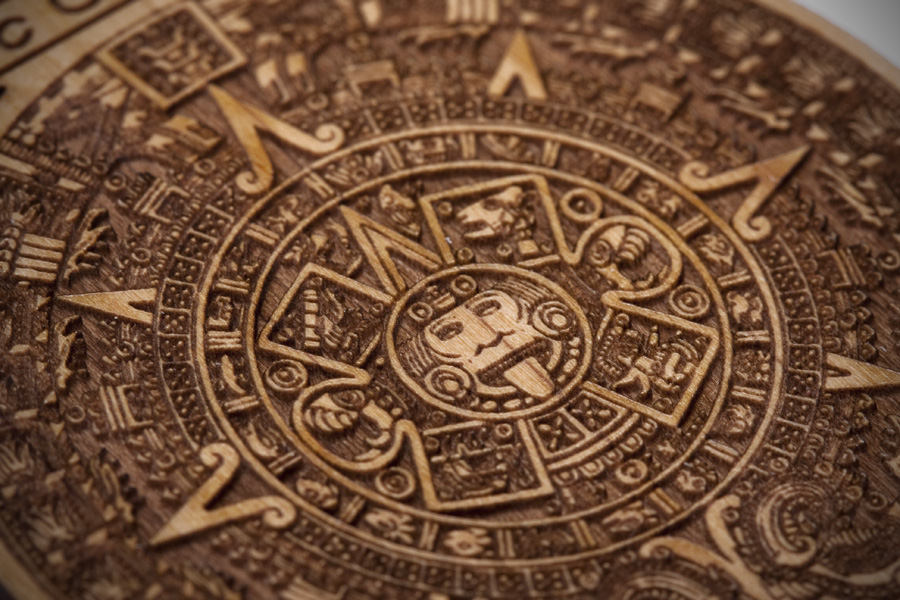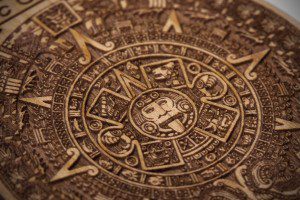
20 Dec TIO LOOKS AT THE END OF THE WORLD – AND LAUGHS
 John Major Jenkins came to town in August for the Telluride Shroomfest.
John Major Jenkins came to town in August for the Telluride Shroomfest.
Jenkins is best known for his works as a researcher and author that theorize certain astronomical and esoteric connections of the calendar systems used by the Maya civilizations of pre-Columbian Mesoamerica. His efforts are specifically associated with 2012 millenarianism. And his is one of the most outspoken voices in promoting the idea that when the ancient Maya calendar ends on December 21, 2012, there will be big changes on our Big Blue Marble.
Well, that time is now. The 5,125-year-long Mayan calendar stops on the date that coincides with the winter solstice: December 21.
Does Jenkins actually think it is apocalypse now? Truth is, no. The end of the world is about as likely as that elephant who speaks Korean adding a second language, like say Arabic, to his trunk of tricks. Rather than an end, as in over and done, Jenkins suggests we are the cusp of a major and hopefully positive transformation. Perhaps the Newtown massacre in all its horror will mark a turning point. Read Jenkins’ “Maya Cosmogenesis 2012” for more or listen to the interview we did for Shroomfest.
Or for a laugh – and heaven knows we all need one – read poet/teacher David Feela’s spin on The End.
Prophetic Optometry
It had been six years since my last exam and I’d been having a little trouble with my eyes, so I
made an appointment. The receptionist called the day before, just to confirm.
“I knew I’d hear from you” I said.
The next morning I filled out some forms and the assistant put me through the usual battery of
tests.
First I had to stare at a tiny house at the end of a long road, a trick of perspective so she could
take a measurement of my eyes.
“I knew that house would still be there” I said, “and next you’ll blow a tiny puff of air into my
eyes” which is exactly what she did.
When she had me turn toward the sphere with the pinpricks of light, I said “This is for peripheral vision” and she said I was right.
But the retinal imaging I didn’t see coming.
“We’ve only had the machine a little over a year now, so your eyes won’t have to be dilated” and as she showed me how to hold my head against the cushion, my eyes actually started to sweat.
Waiting for the doctor in his office, I could see things were worse than I could ever have
foreseen.
When he came through the door I burst out, “Doctor! You’ve got to help me. I can’t see the
future anymore.”
He told me to relax, that the older we get the less distinct the future becomes, “Which is ironic”
he said, “because we’re so much closer to it.”
He fit me with the traditional alien lens viewer and showed me the lines of letters I was instructed
to read.
“E….I….O….and something I can’t quite figure out” I said.
“Good, good” he encouraged, but I knew it wasn’t good. I’d be given a white cane, shoved out the door, forced to make my way in the world by memorizing details, counting steps, feeling my way along just like everyone else.
“I want my vision back” I moaned. “I want to see how things will turn out instead of tripping
over my own inadequacies.”
“Yes, yes” he said, “I’ve got the perfect lenses for that” and he flipped a couple more pieces of
glass until I saw the image of an open coffin at the end of a long aisle with my head crowning on a
satin pillow, wearing a stylish pair of glasses with transition lenses gone black.
“E….N…D” I read.
“Perfect” the doctor replied.
Editor’s note: Author/poet/recently retired teacher-writing instructor David Feela is a regular contributor to Telluride Inside… and Out. Brilliant and very very quirky, his latest book, “How Delicate These Arches: Footnotes from the Four Corners,” a collection of essays, is available at Between the Covers Bookstore.


Sorry, the comment form is closed at this time.